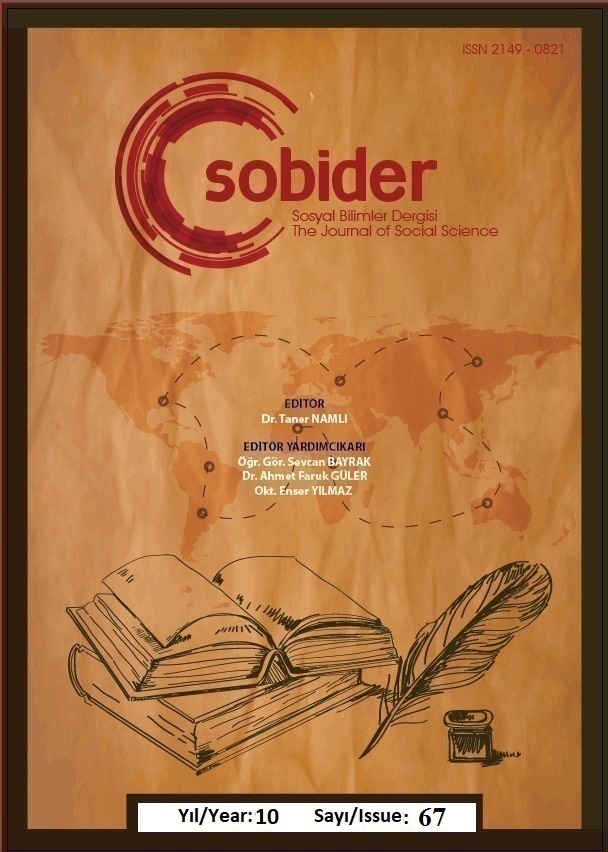Author :
Abstract
Gelişen teknolojinin insan yaşamında etkin olduğu noktalardan biri de eğitim alanıdır. Öğrenmede dijital teknolojinin etkin rol oynadığı bilinmektedir. Bu durumun başarı motivasyonuna etkisinin ne düzeyde olduğu da merak konusu olmaktadır. Bu nedenden dolayı bu çalışmada üniversite öğrencilerinin dijital teknolojiye yönelik tutumlarının başarı motivasyonuna etkisi incelenmiştir. Araştırmada genel tarama modeli kullanılmıştır Araştırmayı seçilmiş üç üniversitenin (Adıyaman üniversitesi, İnönü üniversitesi ve Kahramanmaraş sütçü İmam Üniversitesi) beden eğitimi ve spor yüksek okulu öğrencileri oluşturmaktadır. Ölçek formu online olarak hazırlanmış ve toplam 230 öğrencinin katılımı sağlanmıştır. Araştırmada üç bölümden oluşan veri toplamam aracı kullanılmıştır. Birinci bölümde; Cabı (2016) tarafından geçerlik ve güvenirlik çalışması yapılmış olan Dijital teknolojiye Yönelik Tutum Ölçeği kullanılmıştır. İkinci bölümde; Willis (1982) tarafından geliştirilen ve Tiryaki (1997) tarafından da Türkçe ’ye uyarlanmış olan Spora Özgü Başarı Motivasyonu Ölçeği (SÖBMÖ) kullanılmıştır. Son olarak üçüncü bölümde ise; araştırmacıların demografik bilgilerine yönelik sorulara yer verilmiştir. Verilerin hesaplanmasında SPSS programı kullanılmıştır. Verilere normallik testi uygulanmış ve verilerin normal dağılım göstermesi parametrik testlerin kullanılmasına imkân vermiştir. Ayrıca dijital teknolojiye yönelik tutum ile başarı motivasyonu arasındaki ilişkiyi belirleyebilmek için pearson korelasyon ile regresyon analizi uygulanmıştır. Yapılan pearson korelasyon analizinde dijital teknolojiye yönelik tutum ile başarı motivasyonu arasında güçlü düzeyde pozitif yönde (r: .619; p< .05); ilişki olduğu saptanmıştır. Yapılan regresyon analizinde ise dijital teknolojiye yönelik tutum ile başarı motivasyonu arasında pozitif yönde ve güçlü düzeyde anlamlı bir etkisinin olduğu görülmektedir. Sonuç olarak dijital teknoloji ve başarı motivasyonu arasında pozitif yönde bir ilişki bulunmaktadır. Dijital teknolojinin bireyin başarısında etken olduğu için motivasyon seviyesinde de artış göstermektedir.
Keywords
Abstract
One of the important points where developing technology is effective in human life is the field of education. It is known that digital technology plays an active role in learning. It is also a matter of curiosity to what extent this situation influences achievement motivation. Due to this fact, in this study, the effect of undergraduate students' attitudes towards digital technology on achievement motivation was examined. General survey model was used in the study. The students of physical education and sports schools of three selected universities (Adıyaman University, İnönü University and Kahramanmaraş Sütçü İmam University) constitute the research. The scale form was prepared online and a total of 230 students participated in filling out these forms. In the study, a data collection tool consisting of three parts was used. In the first part, The Attitude Scale Towards Digital Technology, whose validity and reliability study was conducted by Cabı (2016), was used. In the second part, The Sports-Specific Achievement Motivation Scale (SSAMS), which was developed by Willis (1982) and adapted into Turkish by Tiryaki (1997), was used. Finally, in the third part, questions about the demographic information of the researchers were included. SPSS software was used to calculate the data. Normality test was applied to the data, and the normal distribution of the data allows the usage of parametric tests. In addition, Pearson correlation and regression analysis were applied to determine the relationship between attitude towards digital technology and motivation for success. In the Pearson correlation analysis, it was found that there was a strong positive (r: .619; p< .05) relationship between attitude towards digital technology and motivation for achievement. In the regression analysis, it is seen that there is a positive and strong significant relationship between the attitude towards digital technology and the motivation for success. As a result, it has been determined that there is a positive relationship between digital technology and achievement motivation. Since digital technology is a factor in the success of the individual, the level of motivation also increases.





